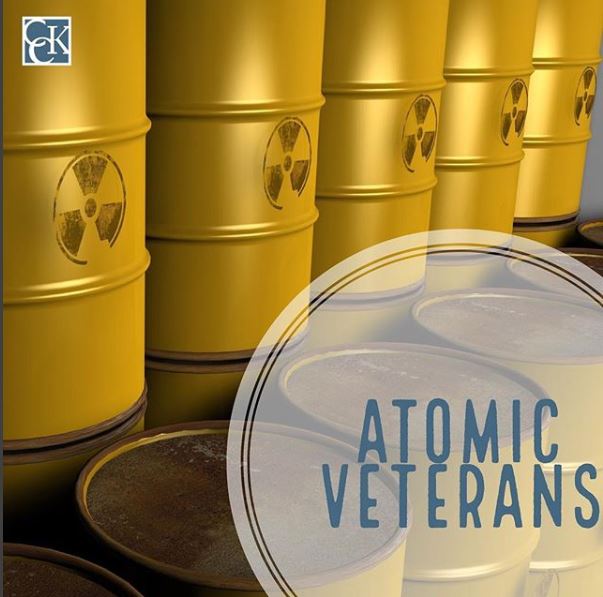Radiation Exposure and VA Disability Compensation

CCK Law: Our Vital Role in Veterans Law
Under certain circumstances, veterans who were exposed to ionizing radiation while in service and later develop a disabling condition are entitled to VA disability compensation.
What Is Ionizing Radiation?
Ionizing radiation includes gamma rays, x-rays, and higher ultraviolet parts of the electromagnetic spectrum. Humans can be exposed by the ionizing radiation passing through their skin, or being inhaled or swallowed. Ionizing radiation is extremely harmful to humans because it contains enough energy to remove electrons from atoms or molecules, and can damage DNA cells.
“Atomic Veterans” and Radiation Exposure
“Atomic Veterans” refers to veterans who participated in “radiation-risk activity.” According to VA, veterans who served in the following locations may have been exposed to ionizing radiation:
- Occupation of Hiroshima and Nagasaki, Japan from August 6, 1945 and July 1, 1946
- Prisoners of War (POWs) in Japan during World War II
- Participants in atmospheric nuclear weapons tests, primarily conducted in Nevada and the Pacific Ocean from 1945 to 1962
- Underground nuclear weapons testing in Amchitka Island, Alaska prior to January 1, 1974
- Any of the following gaseous diffusion plants for at least 250 days prior to February 1, 1991:
- Paducah, Kentucky
- Portsmouth, Ohio
- K25 in Oak Ridge, Tennessee
- “Worked as an x-ray technician, in a reactor plant, or in nuclear medicine or radiography”
- “Did tasks like those of a Department of Energy (DoE) employee that makes them a member of the Special Exposure Cohort”
Additional circumstances in which veterans may have been exposed include:
- The Fukushima nuclear accident in Japan from March 12 to May 11, 2011
- The U.S. Air Force plutonium clean-up mission in Palomares, Spain
- Exposure to depleted uranium
- Exposure to radiation from Long Range Navigation stations (LORAN) from 1942 to 2010
- McMurdo Station, Antarctica nuclear power plant from 1964 to 1973
VA Offers a free Ionizing Radiation Registry health exam to certain veterans who may have been exposed to ionizing radiation.
What Diseases are Associated with Exposure?
The regulation for claims based on exposure to ionizing radiation is 38 C.F.R. 3.311, and it outlines what conditions VA presumes are connected to exposure to ionizing radiation, as well as what veterans need to provide in order to receive compensation.
As stated on VA’s website, VA recognizes certain diseases and conditions as related to exposure to ionizing radiation during military service:
- Cancers including :bile duct, bone, brain, breast, colon, esophagus, gall bladder, liver (primary site, but not if cirrhosis or hepatitis B is indicated), lung (including bronchiolo-alveolar cancer), pancreas, pharynx, ovary, salivary gland, small intestine, stomach, thyroid, urinary tract (kidney/renal, pelvis, urinary bladder, and urethra);
- Leukemias, excluding chronic lymphocytic leukemia;
- Lymphomas, excluding Hodgkin’s disease; and
- Multiple Myeloma.
Veterans who develop the above conditions as a result of their exposure to ionizing radiation during service will be service connected on a presumptive basis. Presumptive service connection means that VA will presume a veteran’s condition is the result of their in-service exposure to ionizing radiation, and will not require that the veteran provide a medical nexus linking their condition to the exposure.
VA also recognizes that the below conditions are possibly caused by exposure to radiation, however, they are not presumed:
- All types of cancers
- Non-malignant thyroid nodular disease
- Brain and central nervous system tumors
- Posterior subscapular cataracts
- Parathyroid adenoma
For these conditions, veterans will have to provide medical evidence that their exposure was “at least as likely as not” the cause of their condition. These claims are decided by VA on a case-by-case basis.
About the Author
Share this Post
